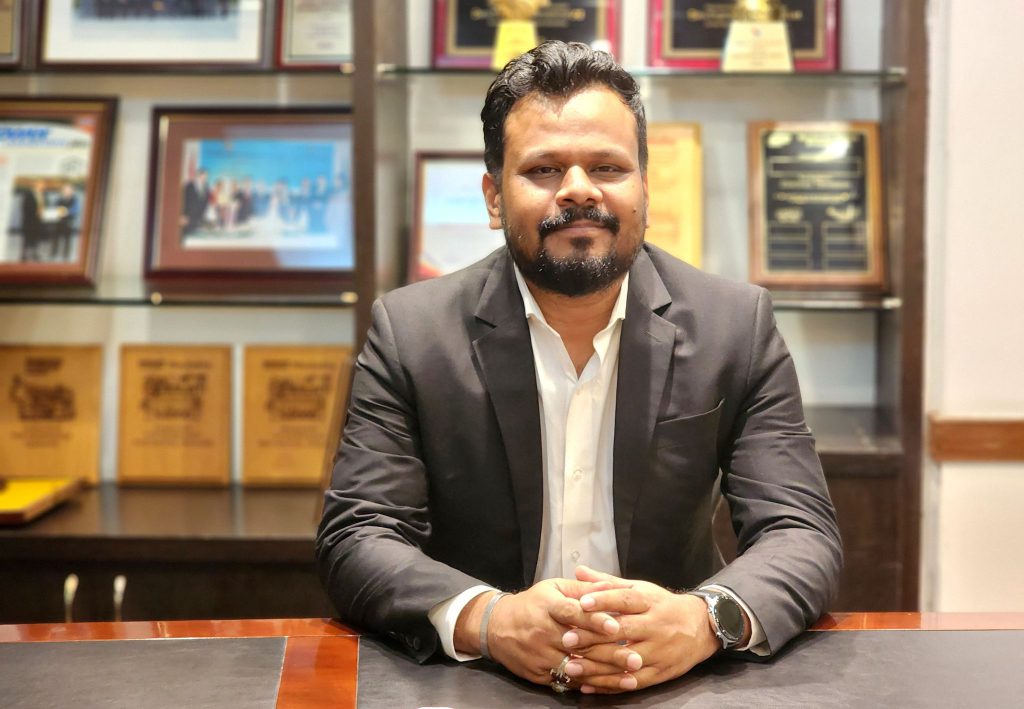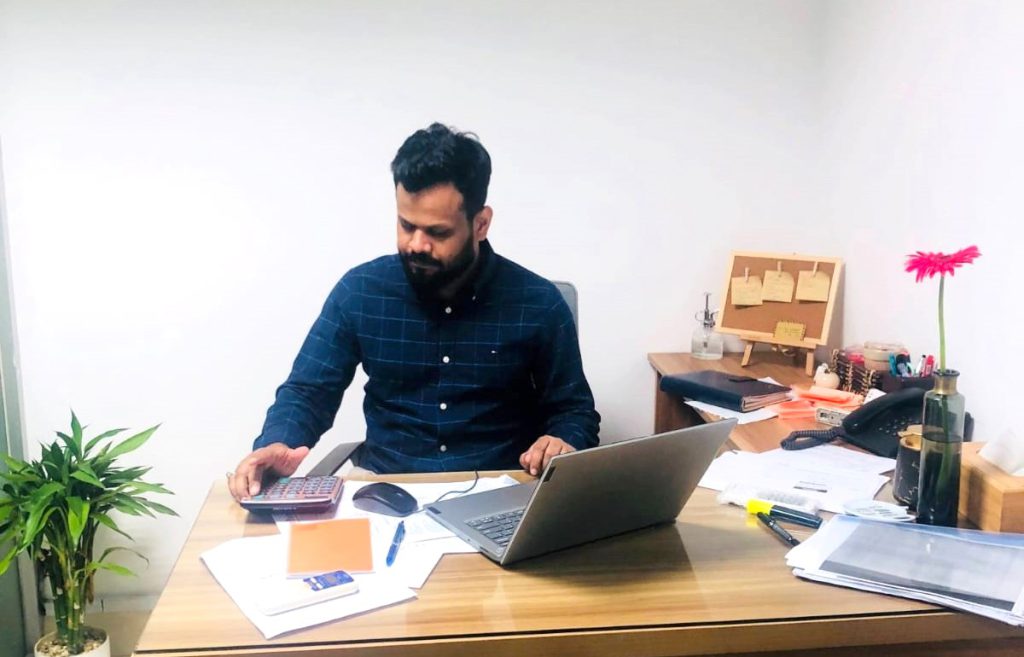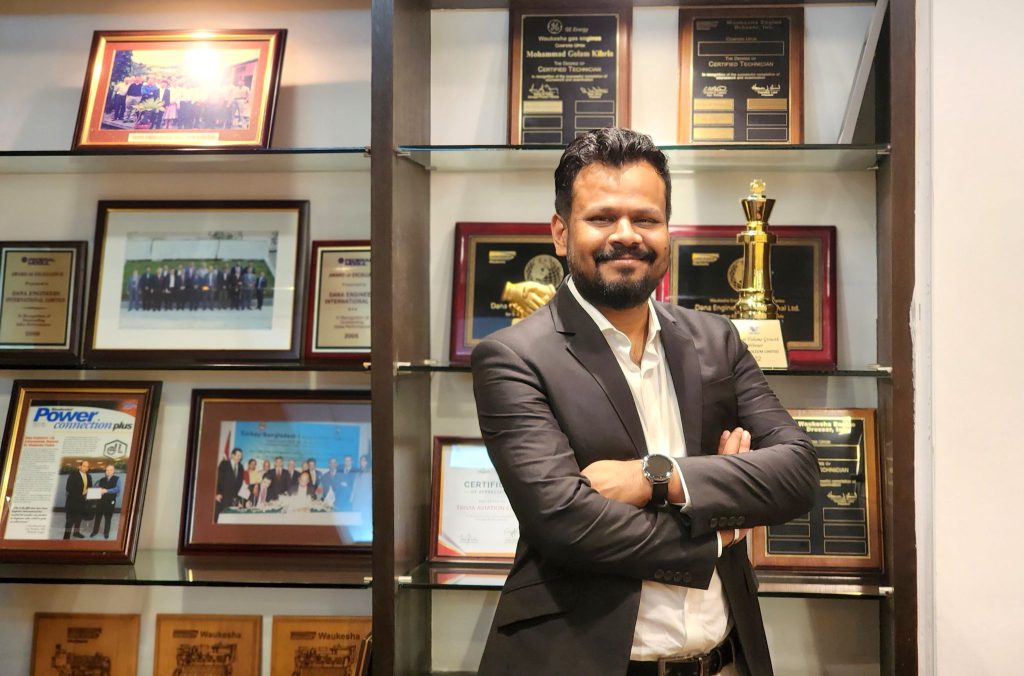Thowhidulla Hamidi, ACCA
Chief Financial Officer
Dana Group Bangladesh
Mr. Thowhidulla Hamidi is a seasoned financial expert and the esteemed Chief Financial Officer of Dana Group Bangladesh. With a proven track record of strategic financial management, he brings a wealth of experience to the table. His dedication to optimizing financial operations and driving sustainable growth is instrumental in Dana Group’s success. His leadership and financial acumen make him an invaluable asset to the organization, embodying the commitment to excellence that defines Dana Group Bangladesh.
Let’s learn about his journey.
The InCAP: Could you please provide insights into your educational background and how your academic journey has influenced your path to becoming the CFO of Dana Group Bangladesh?
Mr. Thowhidulla Hamidi: Certainly, My academic journey has been instrumental in shaping my path to becoming the CFO of Dana Group Bangladesh. I pursued my ACCA qualification, which provided me with a strong foundation in finance and accounting. This academic pursuit equipped me with the technical skills required to excel in the financial industry. Additionally, my education instilled in me a commitment to continuous learning and a passion for understanding complex financial landscapes.
Can you share your journey and key milestones that led you to your current role as CFO at Dana Group Bangladesh?
Certainly, My journey to the role of CFO at Dana Group Bangladesh has been a dynamic and purposeful progression. Each step has contributed to my growth as a financial professional, enabling me to navigate complexities and seize opportunities.
It all began with my pursuit of the ACCA qualification, a decision that laid the foundation for my expertise in finance and accounting. This educational journey not only honed my technical skills but also instilled in me a commitment to excellence and continuous learning.
My professional journey took its first significant turn when I joined KPMG Bangladesh. As an Audit Supervisor, I delved into the intricacies of auditing, developing a meticulous eye for detail and an acute understanding of financial structures. This experience broadened my perspective on financial operations across diverse industries, equipping me with insights that would prove invaluable later in my career.
A pivotal milestone occurred when I transitioned to A.K. Khan Telecom Limited as Manager of Internal Audit. Here, I ventured beyond the realm of audits, delving into financial risk management and process optimization. This role enriched my skill set with a proactive approach to identifying and mitigating financial vulnerabilities.
My journey then led me to Suzuki Bangladesh, where I assumed the role of Finance Manager. Here, I faced the exciting challenges of financial forecasting, bank reconciliations, and strategic financial planning. This role fostered my ability to manage complex financial scenarios and make informed decisions in a fast-paced environment.
However, the most transformative phase of my journey unfolded at Dana Group Bangladesh. I joined as a Manager, contributing my skills to the company’s financial growth. My dedication and determination propelled me to the role of Deputy General Manager (DGM) of Finance and Accounts. In this capacity, I not only managed financial operations but also played a pivotal role in devising and executing strategic financial initiatives. This elevation demonstrated the organization’s trust in my abilities and provided a platform to lead finance functions on a larger scale.
Today, as the CFO of Dana Group Bangladesh, I oversee the entire financial spectrum of the company. This role demands not only technical proficiency but also strategic vision and leadership. I collaborate closely with cross-functional teams, steering financial decisions that drive growth, ensure compliance, and enhance profitability.
My journey has been a cumulative blend of education, diverse professional experiences, and unwavering commitment. Each step has molded me into a strategic financial leader capable of steering Dana Group Bangladesh’s financial success in a competitive market. The key milestones in this journey reflect not only my personal growth but also the growth and success of the organizations I’ve been privileged to be a part of.

What financial strategies have you implemented to drive growth and profitability within the Dana Group?
To drive growth and profitability at Dana Group, I’ve implemented several strategies. One significant approach has been the optimization of financial planning and budgeting. By aligning these processes with the company’s mission and collaborating closely with executives, we’ve fostered strategic decision-making. I’ve also introduced cost-saving initiatives and streamlined internal audit procedures, leading to increased efficiency. Moreover, I’ve focused on developing common operating metrics for all projects, enhancing accountability, and enabling informed performance assessments.
In your view, what are the most significant financial challenges currently facing the business landscape in Bangladesh?
The business landscape in Bangladesh, while brimming with opportunities, also presents several intricate financial challenges that demand astute navigation. As a CFO with a keen understanding of the local dynamics, I can shed light on some of these challenges along with realistic scenarios:
Currency Volatility and Trade Dynamics:
Bangladesh’s economy is significantly influenced by its exports, which makes it susceptible to fluctuations in global currency markets. For instance, if the local currency experiences depreciation against major trading partners, it can lead to increased costs for importing essential raw materials. This could directly impact profitability for businesses reliant on imports, necessitating robust currency risk management strategies.
Access to Capital and Financing:
While the financial sector in Bangladesh has grown, businesses often encounter challenges in accessing adequate capital for expansion and development. Imagine a promising local manufacturing company aiming to invest in innovative machinery to improve production efficiency. Limited access to long-term financing options might hinder this endeavor, impeding growth potential.
Compliance and Regulatory Frameworks:
The evolving regulatory landscape in Bangladesh requires businesses to constantly adapt to new compliance requirements. For instance, changes in tax regulations can affect financial planning and reporting. Navigating these changes while ensuring operational efficiency requires diligent monitoring and adjustment. A company that fails to promptly adapt to new tax regulations might face penalties and reputational risks.
Infrastructure and Energy Costs:
The cost and availability of energy infrastructure can significantly impact operational costs. Imagine a logistics company that relies heavily on transportation. Fluctuating fuel prices and energy shortages can lead to unpredictable expenses, affecting budgeting and overall financial stability.
Scenario: Dealing with Currency Volatility
A manufacturing company in Bangladesh that exports garments faces the challenge of currency volatility. The local currency experiences a sudden depreciation against the US dollar due to global economic shifts. This abrupt currency fluctuation escalates the cost of raw materials, which are often imported. To counter this challenge, the company needs to swiftly adjust its pricing strategy to maintain profitability while remaining competitive in international markets. Additionally, the finance team must implement effective currency risk hedging mechanisms to mitigate future currency-related uncertainties.
Scenario: Regulatory Compliance and Tax Changes
A retail chain in Bangladesh is confronted with changes in the tax structure imposed by the government. Failure to promptly incorporate these changes into their financial planning and operations could lead to inaccuracies in financial reporting and potential legal complications.

Can you highlight a specific financial project or decision you’re particularly proud of during your tenure as CFO?
Certainly, One of the projects that stands out as a testament to strategic thinking and collaborative leadership during my tenure as CFO at Dana Group Bangladesh is the successful implementation of a comprehensive cost optimization initiative.
Recognizing the need to enhance operational efficiency and maximize profitability, we undertook an in-depth analysis of the company’s cost structure across all divisions. The goal was not just to reduce expenses, but to strategically reallocate resources for sustainable growth. Here’s how we approached and executed this transformative project:
Project Scope and Analysis:
We initiated the project by engaging cross-functional teams from various departments, ensuring a holistic understanding of the organization’s operations. We meticulously analyzed every aspect of our cost structure, from procurement and production to distribution and overheads. This provided us with a clear view of where cost efficiencies could be achieved.
Identifying Opportunities:
Our collaborative approach led to the identification of several opportunities for cost optimization. This included renegotiating supplier contracts, implementing energy-efficient measures, and streamlining production processes. We also assessed non-essential expenditures and explored digital solutions to minimize manual tasks and paperwork.
Data-Driven Decision-Making:
Key to the success of this initiative was the use of data analytics. We leveraged advanced financial modeling to simulate the impact of different cost optimization strategies. This data-driven approach allowed us to make informed decisions based on projected outcomes and potential risks.
Stakeholder Engagement:
Throughout the project, communication and engagement were paramount. We ensured that employees at all levels understood the rationale behind the initiative and were aligned with the company’s goals. This fostered a sense of ownership and commitment, which were crucial for the successful implementation of changes.
Implementation and Results:
With a comprehensive plan in place, we executed the identified changes over a strategically planned timeline. This required close coordination across departments and our team’s dedication ensured a seamless transition. As a result of our efforts, we achieved significant cost savings without compromising product quality or customer satisfaction. These savings were then reinvested in key growth areas to further propel the company’s expansion plans.
Key Takeaways:
This project taught us that comprehensive cost optimization is not just about cutting expenses but about intelligent resource allocation. By fostering a culture of continuous improvement and data-driven decision-making, we were able to enhance our operational agility and financial resilience.
I take immense pride in this project as it showcased Dana Group Bangladesh’s ability to adapt, innovate, and collaborate for sustainable growth. It also exemplified the power of strategic financial leadership in driving positive organizational change, which remains a cornerstone of my approach as CFO.
How do you ensure compliance with financial regulations and standards while maintaining a competitive edge in the market?
Maintaining compliance and competitiveness requires a multifaceted approach. Regularly monitoring changes in financial regulations and updating internal policies is crucial. We also prioritize ongoing training for our finance team to ensure a deep understanding of compliance requirements. To maintain a competitive edge, we invest in financial technology, leverage data analytics for insights, and implement best practices. Striking the right balance between compliance and innovation is key.

What are the main strategies you’ve employed to effectively manage financial risks in a diverse business portfolio like Dana Group’s?
Effectively managing financial risks in a diverse business portfolio requires a comprehensive risk assessment process. We begin by identifying potential risks across all sectors of the business, considering factors such as market volatility, regulatory changes, and economic conditions. Then, we implement tailored risk mitigation strategies. These strategies may involve diversifying investments, hedging against currency fluctuations, and maintaining robust internal controls. Regular monitoring and scenario planning allow us to adjust our strategies as needed to ensure the resilience of the business.
How do you approach financial decision-making when it comes to large-scale investments in the engineering and power sectors?
Large-scale investments in the engineering and power sectors require a thorough analysis of potential returns, risks, and long-term viability. I approach decision-making by leveraging financial modeling techniques to forecast potential outcomes and assess project feasibility. Additionally, I collaborate closely with cross-functional teams to ensure alignment with company goals and a deep understanding of technical aspects. Rigorous due diligence, scenario analysis, and consideration of market trends guide our investment decisions, aiming to optimize returns while managing associated risks.
What role does sustainable finance play in Dana Group’s financial strategies, particularly in the context of the engineering and power sectors?
Sustainable finance is a pivotal element of Dana Group’s financial strategies. In the engineering and power sectors, where environmental impact is a critical concern, we prioritize investments in sustainable and renewable technologies. These investments not only align with our corporate social responsibility goals but also position us for long-term profitability. By integrating environmental, social, and governance considerations into financial decision-making, we ensure that our business practices are both responsible and resilient, contributing to the overall success of Dana Group.
Mr. Thowhidulla Hamidi, what advice would you give to aspiring finance professionals looking to achieve success in their careers, especially in a leadership role like CFO?
Achieving success in a finance career, especially as a CFO, demands more than technical prowess. Aspiring finance professionals should couple their financial expertise with a profound comprehension of their organization’s business processes, enabling them to connect financial decisions with broader outcomes. Continuous learning is essential, encompassing both technical and soft skills, while also cultivating a holistic understanding of industry dynamics. Effective communication and collaboration skills are pivotal, allowing finance leaders to bridge departments and align strategies. A successful CFO should excel in risk management, anticipating challenges through scenario planning, and upholding ethical and transparent financial practices. In essence, combining financial expertise with strategic thinking, ethical conduct, and holistic business understanding defines success in finance leadership roles.

Quick Chat With Thowhidulla Hamidi
The most outstanding achievement of your life as of now:
The successful transformation from a dedicated finance professional to the role of CFO at Dana Group Bangladesh stands as my most outstanding achievement thus far.
The greatest philosopher in your view:
John Stuart mill.
Your Icon:
Warren Buffett.
Name the most influential books you have read:
“Thinking, Fast and Slow” by Daniel Kahneman, “Good to Great” by Jim Collins, and “The Lean Startup” by Eric Ries have been highly influential reads that have shaped my perspectives.
Your greatest fear:
Embracing stagnation and complacency is my greatest fear, as growth and progress define my journey.
Best piece of advice you’ve received:
The best advice I’ve received is to embrace challenges as opportunities for growth, as they mold character and lead to exceptional achievements.
You in only three words:
Dynamic, Visionary, Driven.
Skill Set
Hard Skills: Financial Modeling, Business Valuations, IFRS & IAS, Performance Management (Balanced Scorecard, SWOT Analysis), Budgeting, ERP Implementation, Internal Control, Compliance.
Soft Skills: Leadership, Team Collaboration, Communication, Adaptability, Problem-Solving, Decision-Making.
Prayer for The Human Civilization:
In a world of complexity, let compassion guide our actions, wisdom shape our decisions, and unity strengthen our bonds. May our endeavors lead to progress that benefits all, and may harmony and understanding prevail in the human family.
The InCAP: Thank you, Mr. Thowhidulla Hamidi! It’s a glittering conversation with you!
Mr. Thowhidulla Hamidi: My pleasure! Wish you all the best! Thank you.
To read more about Corporate Genius stories, Please Click Here!






